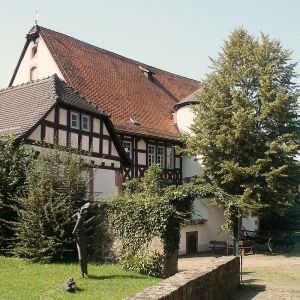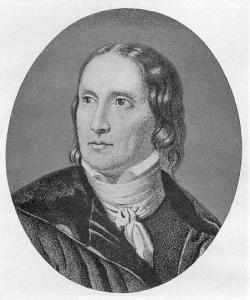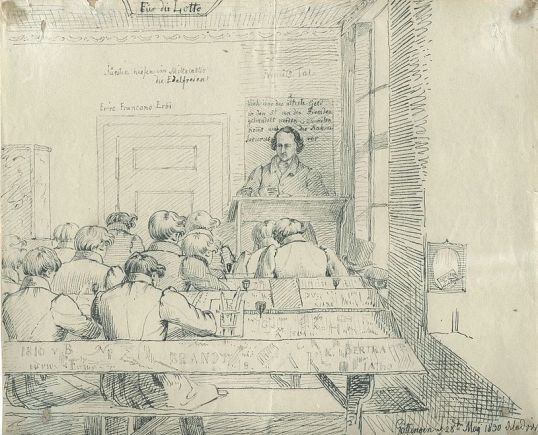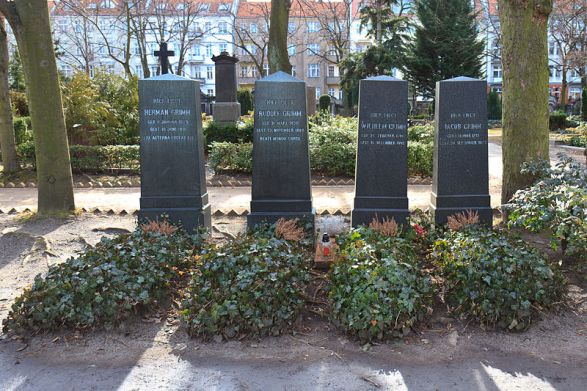We all know who the Grimm Brothers are, Jacob and Wilhelm Grimm, were German academics, philologists, cultural researchers, lexicographers and together authors of a collection of folklore stories during the 19th century.

On 4 January 1785 Jacob Ludwig Carl Grimm was born, followed a year later on 24 February 1786 Wilhelm Carl Grimm was born. Both boys were born in Hanau in Landgraviate of Hesse-Kassel within the Holy Roman Empire (present-day Germany), to Philipp Wilhelm Grimm and Dorothea Grimm. They were second and third eldest of nine children, three of whom died in infancy. In 1791 when their father, Philipp Wilhelm Grimm, a jurist, was employed as a district magistrate in Steinau, the family moved with him to the countryside. They became prominent members of the community, residing in a large home surrounded by fields.
Biographer Jack Zipes writes that “the brothers were happy in Steinau and clearly fond of country life”.
The Grimm children were educated at home by private tutors, receiving strict instruction as Lutherans that instilled in both a lifelong religious faith. Later on, they would attend local schools.

On 10 January 1796 Philipp Wilhelm Grimm dies of pneumonia, plunging his family into poverty forcing them to relinquish their servants and large house. Their mother, Dorothea Grimm, became depended on financial support from her father and sister, who was first lady-in-waiting at the court of William I, Elector of Hesse.
At the age of eleven and being the eldest son, Jacob was forced to assume adult responsibilities, shared with Wilhelm, for the next two years. The two boys obeyed the advice from their grandfather, who continually encouraged them to be hardworking.
In 1789, Jacob and Wilhelm left Steinau and their family to attend the Friedrichsgymnasium (a school) in Kassel, paid and arranged by their aunt. That year their grandfather died, so they were without a male provider, this forced them to start relying on each other resulting in the brothers to become exceptionally close.
The two brothers differed in personality; Jacob was introspective while Wilhelm was outgoing, although he often suffered from ill-health. In Kassel, they became highly aware of their inferior social status comparative to “high-born” students who received more attention. However, sharing a strong work ethic, they excelled in their studies, each brother graduating at the head of his class. Jacob in 1803 and Wilhelm in 1804.
After graduation, the brothers attended the University of Marburg, which was small with about 200 students. The brothers became painfully aware that students of lower social status were not treated equally. They were disqualified from admission because of their social standing and had to request dispensation to study law. Wealthier students received stipends, but the brothers were excluded even from tuition aid. Their poverty kept them from student activities or university social life. Ironically, however, their outsider status worked in their favour, also pursuing their studies with extra vigour.

While at the university, the brothers were inspired by their law professor, Friedrich Carl von Savigny, who awakened in them an interest in history and philology, and they turned to studying medieval German literature. They also shared Friedrich Carl von Savigny’s desire to see unification of the 200 German principalities into a single state.
Through Friedrich Carl von Savigny and his circle of friends, German romantics such as Clemens Brentano and Ludwig Achim von Arnim, the brothers were introduced to the ideas of Johann Gottfried Herder, who though that German literature should revert to simpler form, which he defined as “Volkspoesie” (natural poetry) as opposed to “Kunstpoesie” (artistic poetry).
The brothers dedicated themselves with great enthusiasm to their studies, even Wilhelm wrote in his autobiography, “the ardour with which we studied Old German helped us overcome the spiritual depression of those days”.
Jacob was still financially responsible for his mother, brother, and younger siblings in 1805, so he accepted a post in Parish as research assistant to Friedrich Carl von Savigny. On his return to Marburg, he was forced to abandon his studies to support the family, whose poverty was so extreme that food was often scarce, so he took a job with the Hessian War Commission.
Wilhelm wrote a letter to his aunt at this time of their circumstances, “We five people eat only three portions and only once a day”.
Jacob found full-time employment in 1808 when he was appointed court librarian to the King of Westphalia and went on to become librarian in Kassel. After their mother passed away that year, he became fully responsible for his younger siblings. He arranged and paid for his younger brother, Ludwig Emil Grimm’s studies at art school and for Wilhelm’s extended visit to Halle to seek treatment for heart and respiratory ailments, following which Wilhelm joined Jacob as librarian in Kassel.
About this time, Jacob and Wilhelm began collecting folk tales in a cursory manner and on Clemens Brentano’s request. According to biographer Jack Zipes, “the Grimms were unable to devote all their energies to their research and did not have a clear idea about the significance of collecting folk tales in this initial phase”.
During their employment as librarians, which paid little but afforded them ample time for research, Jacob and Wilhelm experienced a productive period of scholarship, publishing a number of books between 1812 and 1830. They published their first volume of 86 folk tales, “Kinder – und Hausmarchen”, followed quickly by two volumes of German legends and a volume of early literary history. They also went onto publish works about Danish and Irish folk tales and Norse mythology, while continuing to edit the German folk tale collection.
These works became so widely recognised that the brothers received honorary doctorates from universities in Marburg, Berlin and Breslau (now Wroclaw).
In 1825 Wilhelm married a long-time family friend, Henriette Dorothea Wild, who also supplied the brothers with stories. Jacob never married but continued to live in the household with Wilhelm and Henriette. You can see that the brothers had a very close bond, it might be due to their upbringing, but to continue into their adulthood, shows how close they really were.
In 1830, Jacob and Wilhelm were overlooked when the post of chief librarian came available, which disappointed them greatly. They moved the household to Gottingen in the Kingdom of Hanover where they took employment at the University of Gottingen, Jacob as a professor and head librarian and Wilhelm as a professor.

During the next seven years, Jacob and Wilhelm continued to research, write and publish. In 1835 Jacob published the well-regarded “Deutsche Mythologies” (German Mythology). Wilhelm continued to edit and prepare the third edition of “Kinder – und Hausmarchen” for publication.
Jacob and Wilhelm taught German studies at the University of Gottingen, becoming well-respected in the newly established discipline.
After joining in protest with the Gottingen Seven, in 1837 they lost their university posts.
The 1830s were a period of political upheaval and peasant revolt in Germany, leading to the movement for democratic reform knows as “Young Germany”. Jacob and Wilhelm weren’t directly aligned with the Young Germans, but five of their colleagues reacted against the demands of King Ernest Augustus I, who dissolved the parliament of Hanover in 1837 and demanded oaths of allegiance from civil servants, including professors at the University of Gottingen. For refusing to sign the oath, the seven professors were dismissed and three were deported from Hanover, including Jacob who went to Kassel. Wilhelm, Henriette and their four children later joined him there.
Friedrich Carl von Savigny and Bettina von Arnim appealed successfully to Frederick William IV of Prussia in 1840 on behalf of the Grimm brothers, who were offered posts at the University of Berlin. In addition to teaching posts, the Academy of Sciences offered them stipends to continue their research.
Once they had established their household in Berlin, they directed their efforts towards the work on the German dictionary while continuing to publish their research.
Jacob turned his attention to researching German legal traditions and the history of the German language, which was published in the late 1840s and early 1850s. Wilhelm began researching medieval literature while editing new editions of “Kinder – und Hausmarchen”.
After the Revolutions of 1848 in the German states, Jacob and Wilhelm were elected to the civil parliament. Jacob becoming a prominent member of the National Assembly at Mainz. However, their political activities were short-lived, as their hope dwindled for a unified Germany and their disappointment grew.
Also, in the late 1840s, Jacob resigned his university position and saw the publication of “Geschichte der deutschen Sprache” (The History of the German Language). Wilhelm continued at his university post until 1852. After retiring from teaching, Jacob and Wilhelm devoted themselves to the German Dictionary for the rest of their lives.
On 16 December 1859 Wilhelm died of an infection in Berlin. Jacob became increasingly reclusive, deeply upset at his brother’s death. And no doubt, it’s obvious by the love they had for each other. Jacob continued to work on the dictionary until his death on 20 September 1863.
Biographer Jack Zipes writes on the Grimm brothers’ dictionary and of their very large body of work, “Symbolically the last word was Frucht (fruit)”.

